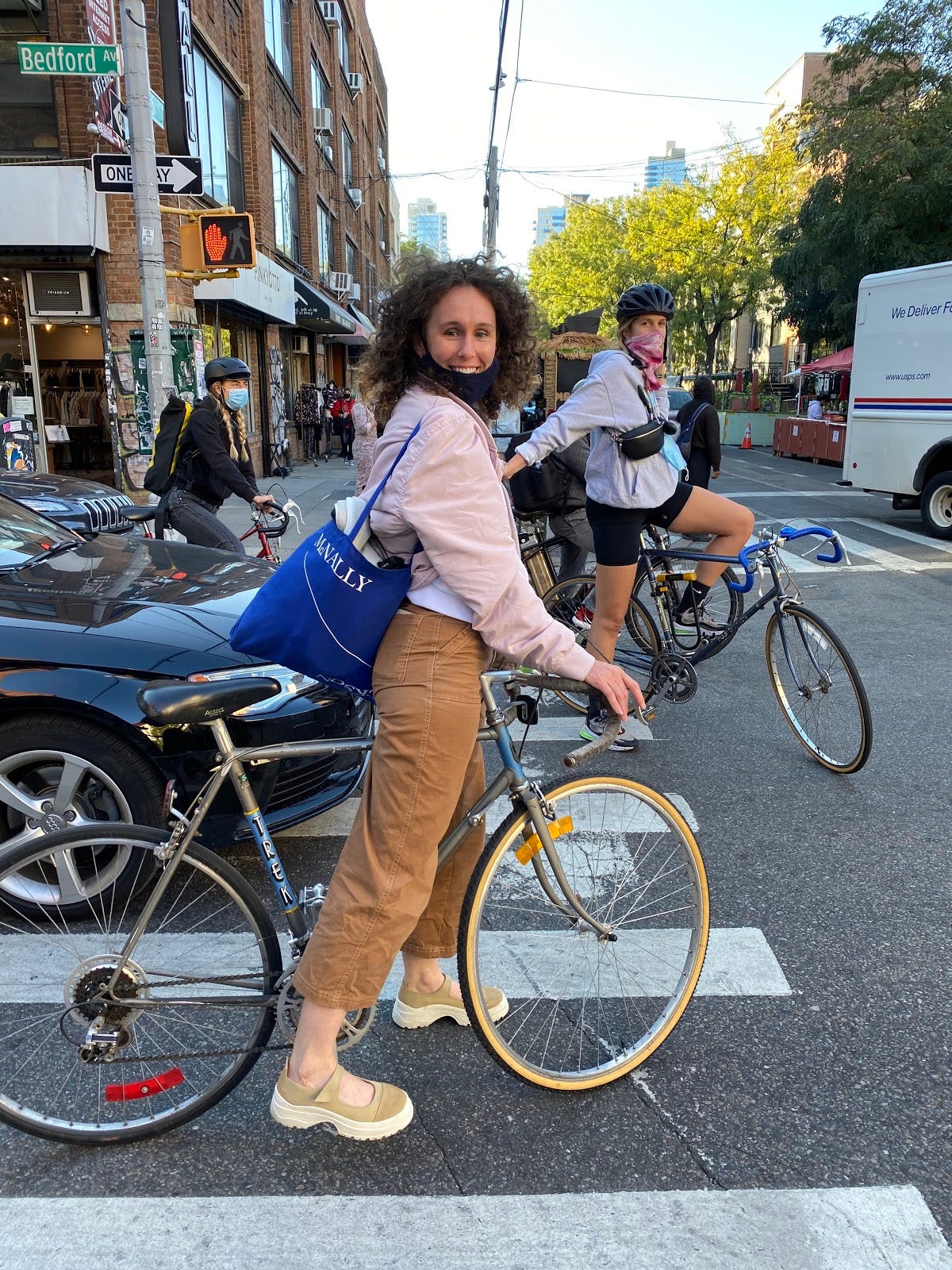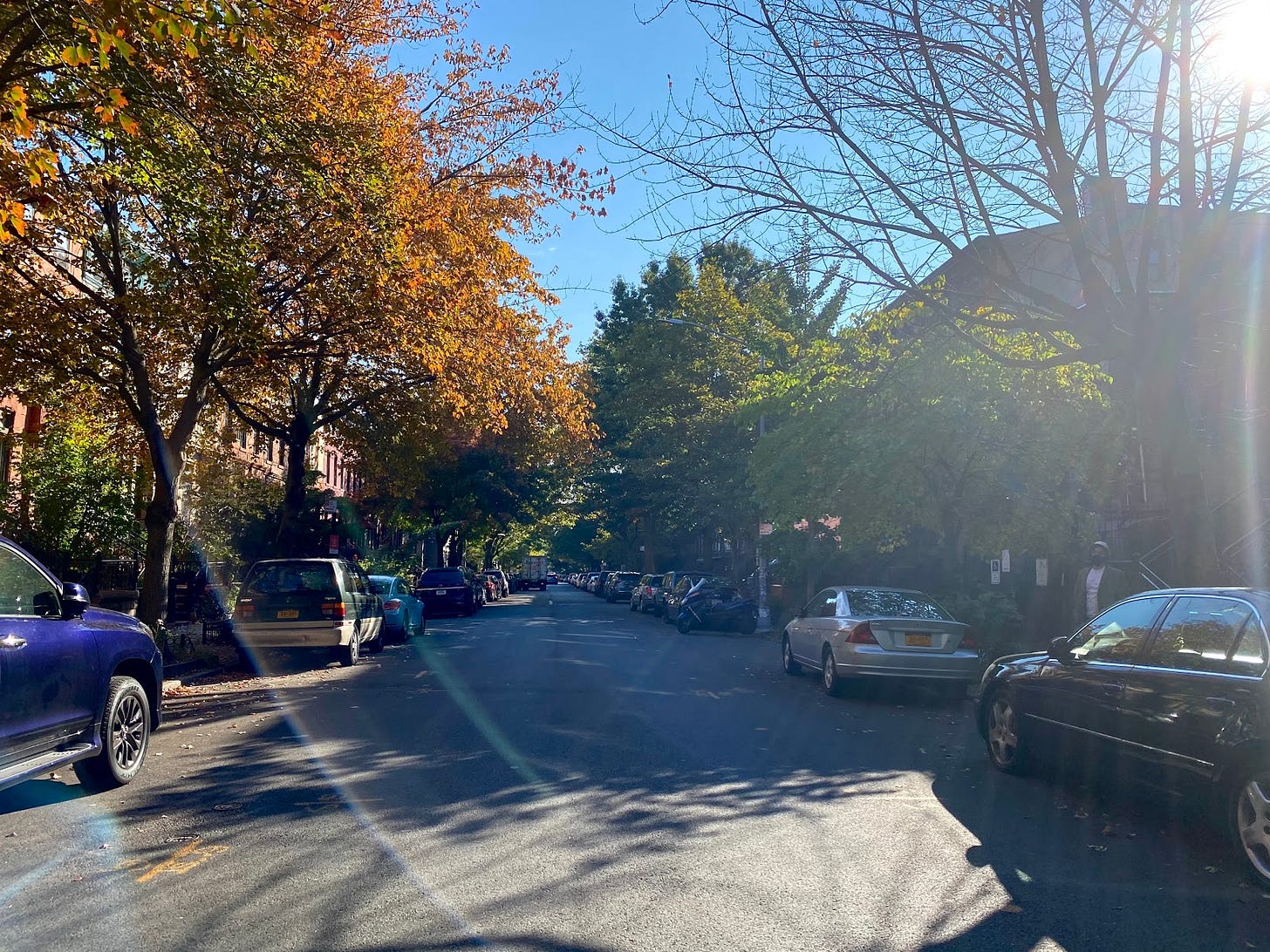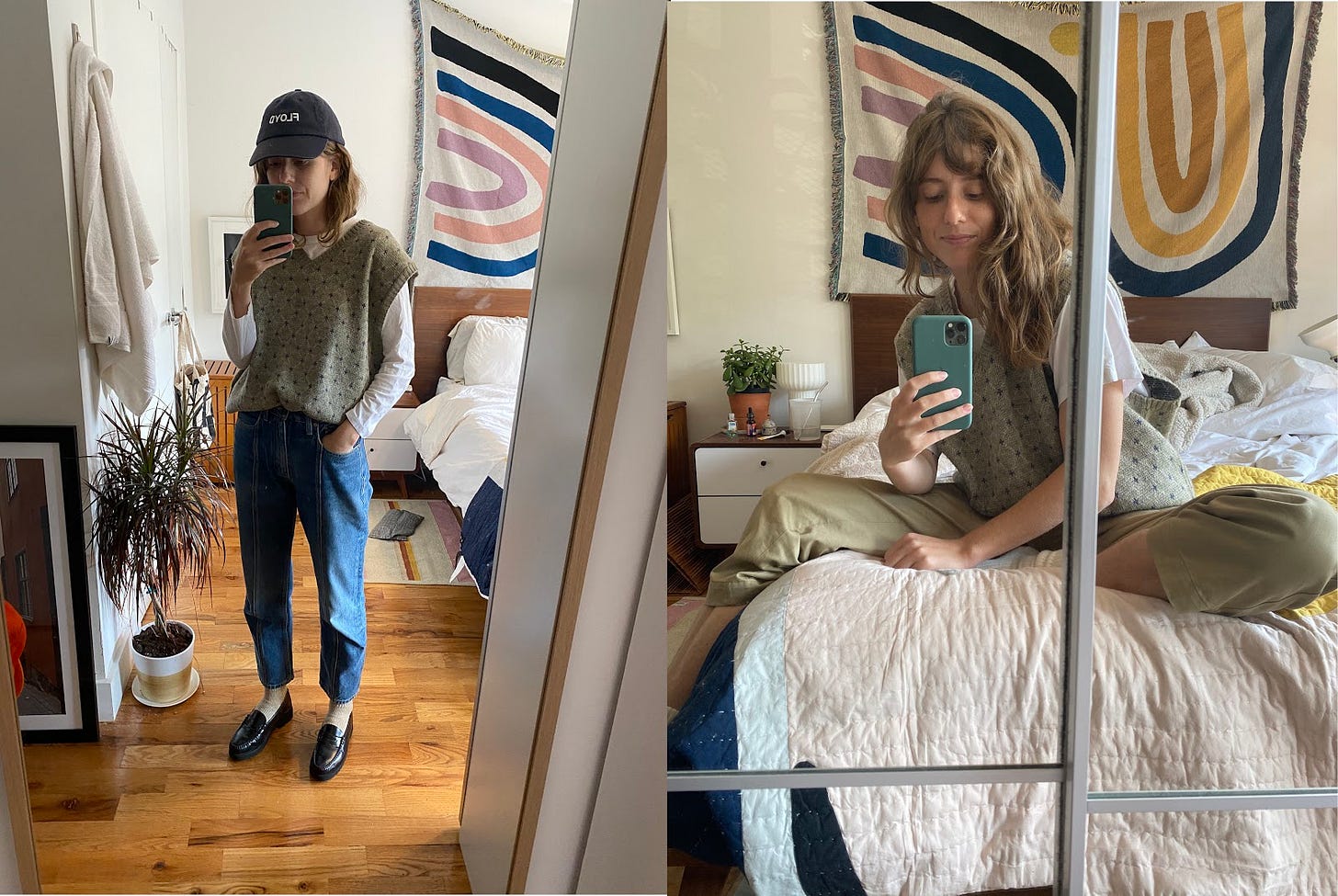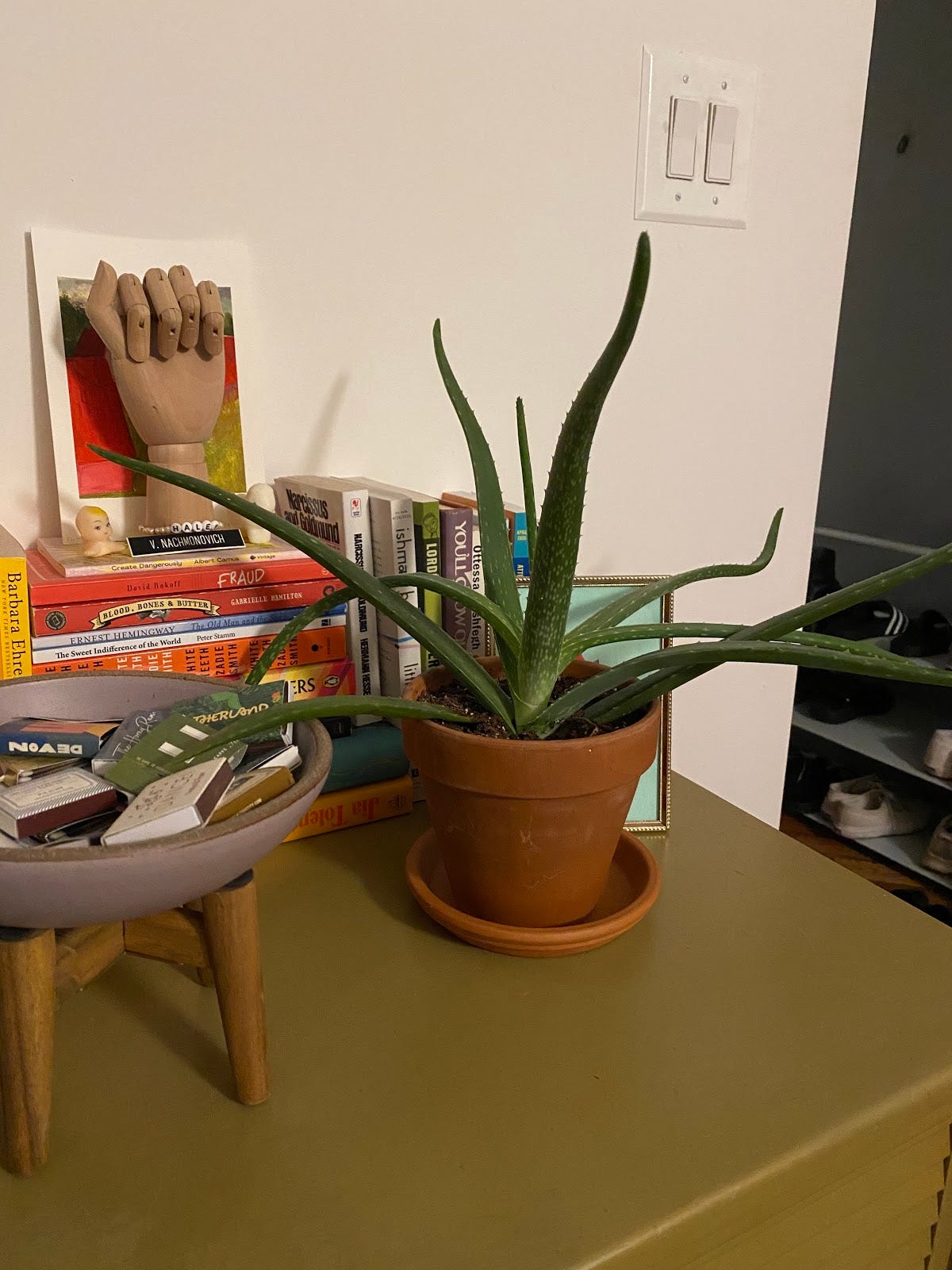Maybe Baby is a free Sunday newsletter. If you love it, consider supporting it financially. For $5/mo, you’ll gain access to my monthly advice column, Dear Baby, as well as my Tuesday weekly podcast. Thank you! (You’ll never see an ad either way.)

Good morning,
Last week I wrote a ton and threw everything out, which is usually a sign that I’m in a weird place mentally, and I am. I guess it would be weirder if I weren’t! Anyway, below is something I finally wrote by week’s end. I hope you’re having an okay Sunday. Here’s a photo of me vacuuming cat hair, my only daily routine:

The natural order of things
Today I woke up to the news that President Trump had tested positive for Covid-19, and truly, it felt like Christmas morning. I was still half-asleep in my pajamas when Avi told me, and then I experienced a jolt of what I can only describe as festive jubilance. I felt alive! Like I was 10 and there was a tankini under the tree! I peed like it was an honor, got dressed as if it were something I did every day. I basked in the warm embrace of a racist demagogue finally facing one (1) consequence for his callousness, even if it was just a cough. I texted my family that I’d promise to return to the church if he had to step down. We all laughed. I wondered if this is what happiness feels like, because honestly I’d forgotten. Then I logged onto Twitter.
At first it seemed like everyone was in a good mood for the first time in six months. The tweets were making me laugh—claims that no one needed their coffee or anti-depressants today, people welcoming Hope Hicks to the resistance. Obviously there’s something twisted about celebrating an old man contracting an illness, but when you consider the number of lives lost and endangered due to his sociopathic cruelty, you have to admit there’s more than a little poetic justice to it. As someone else tweeted, this is “the easiest trolley dilemma ever.” But the TL didn’t stay cheery for long. Close behind the jokes were people pointing out that it was below-the-belt to not wish sick people well (even fascists), others claiming it was a hoax, others reminding their followers that everything was still horrible, dare they feel a moment of satisfaction that, somewhere around Trump’s 20,000th lie, one finally didn’t pan out. The fighting and subtweets followed, and the rare snow-day energy dissipated.
“Can’t the scolds just let us have this one?” I asked Avi.
“Of course not,” he replied. “It’s Twitter.”
He was right, obviously. You don’t log onto Twitter for good-faith debate, or even to feel good. You log on to agree with people you like, disagree with people you don’t like, and to do it in short, careless bursts, sometimes for a laugh. It’s a public stage for private instincts. It’s the perfect embodiment of Marshall McLuhan’s theory that “the medium is the message,” which posits that how a story is told is just as important as the story itself, and can even usurp it. He said this in 1964! Political Twitter is about tribalism and one-upmanship, and the ideas shared there are informed and changed by that context. I think to assume otherwise, as I often mistakenly do, is to miss something important about modern communication. Or maybe life in general.
Despair goggles
I’ve actually been thinking about McLuhan’s “the medium is the message” a lot lately, and how it can be applied to all kinds of things outside media theory. For example, a couple weeks ago I bought a bike on Craigslist and started riding it around Brooklyn. I’ve never owned a bike in New York before, and had previously only experienced the city by foot, train, or car, which are completely different. On a bike, you can cover a lot of ground in a short amount of time, which makes New York feel massive and accessible. But unlike a car or train, you’re more connected to the visceral quality of the city: the wind on your face, the smell of the wet trees, the snippets of people’s conversations—the same things you might experience while on a walk, but on a larger scale, and at a faster, less deliberate pace. Which is to say, you could walk, drive, train, or bike down the same block and draw completely different conclusions about the space you’ve just traversed. The medium is the message. The how changes the what.

A new and chaotic form of socializing: biking with friends.
Sometimes this is obvious to us, like when a Zoom hangout sucks in comparison to the real thing. But other times it’s more insidious, like when you become convinced your personality is awful but actually you’re just depressed. I call that “wearing depression goggles,” because you don’t realize you’re wearing them, but they change how everything looks. Same goes for anxiety goggles, or euphoria goggles (but we like those). Moods are a kind of medium, changing the message of our perception. Looking at McLuhan’s theory that way, I wonder what quarantine has done to imperceptibly alter us beyond the most obvious way, like that we can’t see our friends or go to work or out to dinner. If a mood is a medium is a message, what story is born from collective, inexhaustible despair?
Before covid, I used to think about this a lot in terms of the broken New York subway system. I wondered what ambient shifts took place in the city based on the fact that most of its inhabitants started their day packed into a sweaty coffin, late for work, enraged at authority and their lack of ability to hold them to account. Obviously there are material impacts of a failing transit system, but what about the invisible ones, like a civilian population that is continually reminded they are powerless? The little things add up. So when you consider something as massive as a pandemic—with its sweeping consequences ranging from mass unemployment to social isolation to political unrest—it starts to make sense that nothing feels good right now. Not even the things that used to feel good, or should in theory. Our whole perspective is fucked.
Paradigm shift
I know I’m not saying anything new, but I find myself in need of constant reminding that I feel awful for a reason that is both very specific and beyond comprehension. When I think of McLuhan’s theory as a diagnosis on the human condition, there are so many directions you can take it: How does our understanding of work change when it’s no longer counterbalanced by leisure? What happens to our self-perception when we’re only able to express ourselves as digital commodities? How does the meaning of life shift when disease, corruption, and disaster threaten the future of all living things? The chaos we’re experiencing right now might be hard to contain or treat because it’s not just a result of the most literal impacts of the pandemic, often measured in statistics, but the less traceable paradigm shifts it has incited. Time warps, blown-out surge capacities, loss of future, loss of novelty, mass unmournable death.

Bedstuy turning
On a recent gray morning, I put on sneakers and a sweater and took my bike out for a ride. As I made my way up Stuyvesant Avenue, the street was empty save for a few morning walkers, and the chill in the air felt new but familiar. I looked up and noticed the trees I’d watched bloom on lonely April walks, from bare to white to green, were turning yellow, and shivering. Brooklyn looked and felt different than it had the day before, and I felt a rush of gratitude for that. It seemed like a reminder not only that time was moving forward in at least one (1) way that was predictable and productive, but that we were being given the opportunity to see things differently. To re-access the sense that life goes on, even when that notion is most inaccessible.
As cliche as it is to invoke fall as symbolic of change, it’s hitting different this year. I’ve been nervous about the downshift in temperature for weeks, but now that it’s here it feels like a welcome shift in medium for a message that’s grown as stagnant as it is depressing. Novel weather brings novel meanings. My apartment is feeling a little cozier. Right now, for however long it will last, time feels like it’s passing, instead of simply passing unobserved. I had no idea how integral it was to my worldview, the belief that life would continue to evolve. But I’ve felt lost without it, and in the rare moments I remember, briefly found.

1. Today’s Small Good Thing is the most charming novelty site I’ve ever seen, shared recently by a reader: Window Swap. Every time you refresh you get to see out someone else’s window, somewhere in the world.
2. The first presidential debate, which was obviously awful, but I was possibly more put off that anyone found that surprising.
3. “Find Something to Hide As Soon As Possible,” Sam Jaffe Goldstein’s incredible (Substack!) interview with the inimitable Anne Boyer:
“[P]eople are made to be as things in that they are fractured, injured, used up, wasted, exploited, branded, self-exploited, self-branded, tossed out. Or we are made to be something even more wretched than things, in that we live as things—as instruments of work, domination, competition, etc—but unlike things, we can be overwhelmed with feeling. We are made as things with melancholy, things with imagination, things with rage. But we are not things. The whole process depends on a soulless world in order to become totalizing, complete. There is no such thing as a soulless world. Whatever you forgot to sell, whatever couldn’t be consumed or debased, whatever hides away, whatever can never be ground up into sellable particles of metadata, whatever exists in the relation of love against the relation of profit, whatever refuses a brand: this is the soul, the organ of refusal.”
4. A foldable fabric CD case that we’re going to affix to the sun visor in our car to hold all the CDs Avi brought back from his recent trip home to Detroit, ranging from AFI to Kenny G’s Christmas album. Are CDs back? Time will tell...
5. As many excuses as I could find to wear my new (vintage) sweater vest and compulsively document it like a loser!

6. A moving 10-minute episode of The Daily, which I don’t typically listen to, featuring the poet Terry Tempest Williams, called “An Obituary for the Land.”
7. “Why Is Uber Begging Me to Vote?” by Amanda Mull for The Atlantic, which examines one angle of the mass marketing push to vote. On these corporations, she says:
“No matter what they sell or how they sell it, they all seem to be comfortable marketing themselves as advocates of democracy and civic engagement, so long as their customers are willing to do the heavy lifting.”
8. Several articles about what to do when you stab your eye with an aloe plant and spend the rest of the day feeling like a fingernail clipping is stuck under your eyelid.

My nemesis
9. “Whores at the End of the World,” a gripping, diary-like essay for N+1 by Sonya Aragon, in which she examines the complexity of sex work and choosing to “align herself with criminality.”
10. A Snickers bar and a Diet Sprite (was in a weird mood) while watching My Octopus Teacher, which honestly I loved.
11. Keeanga-Yamahtta Taylor’s “The Case for Ending the Supreme Court As We Know It,” for The New Yorker, which soberly (and compellingly) details the impact of the court over the last 150 years.
12. The movie Casablanca for the first time, after which I concluded the line, “Here’s looking at you, kid” was honestly a bit much and didn’t really fit with the characters.
13. “Goodbye, Brooklyn,” a three-year-old short film by Daniel Jaffe and Michelle Uranowitz, who emailed it to me in response to my newsletter. Earnestly loved it and laughed out loud twice (rare).
14. Novelist Jesmyn Ward’s Vanity Fair essay on her husband’s death in January, “On Witness and Respair,” which made me cry.
15. For reasons I can’t quite explain nor care to defend, this video of YouTube-famous Emma Chamberlain “making ugly clothes cute.”
That’s it for this week, thanks for reading. And to whoever needs to hear this…happy birthday!
Haley

This month a portion of subscriber proceeds will be donated to Open Path Collective, a nationwide non-profit network dedicated to providing affordable therapy to those in need.
Request a comped subscription • Ask Dear Baby a question • Gift a subscription




I just have this one (1) comment. This is the best newsletter.
this was such a cozy newsletter. and “my nemesis” really just gave me a good laugh at work rn